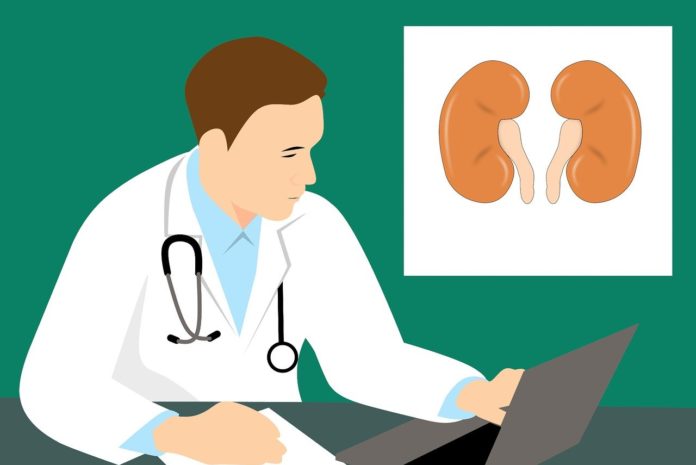By Sean T. McGinley, MD
Kidney stones are a common medical problem, affecting an estimated 1 in 10 Americans each year, according to the American Urological Association.
While some stones may not cause any symptoms, others can cause debilitating pain.
Urologists at Penn Medicine Princeton Health are experts in diagnosing and treating kidney stones, and offer personalized care customized to meet each patient’s unique needs.
What are kidney stones?
Kidney stones are hard deposits that form in the kidneys. They can be composed of various substances found in the urine, but most stones — approximately 80% — are calcium stones.
Calcium stones can form when you have too much calcium in your urine, but even people with normal amounts of calcium in their urine can form calcium stones.
Less common are uric acid stones, which can develop when you have acidic urine; struvite stones, which are related to chronic urinary tract infections or poor bladder emptying, and cystine stones, which occur when there is a high amount of cystine (a type of amino acid) in the urine.
Kidney stones vary in size and are typically about the size of pea though some can be as small as a grain of sand or, in rare cases, as large as a golf ball. Stones may stay in the kidney or break loose and travel down the urinary tract.
Some stones may pass in the urine unnoticed, but others may get lodged in the urinary tract, blocking the flow of urine and causing pain and other symptoms.
While kidney stones can affect both women and men, men are typically more prone to develop stones.
What causes kidney stones?
There are a variety of factors that can increase the risk for kidney stones to form, including:
- A diet high in animal proteins, oxalate (a natural compound found in many foods) and/or sodium.
- Poor hydration, leading to low urine volume.
- Obesity.
- Certain medications, such as diuretics, antacids and calcium supplements.
- Underlying medical conditions, such as diabetes, gout, inflammatory bowel disease, recurrent urinary tract infections.
Additionally, once you have had a kidney stone, the risk for future stones increases.
What are the symptoms?
Symptoms of kidney stones vary. Some stones may go unnoticed. However, if a stone blocks urine flow while passing, it can cause significant pain that may come in waves and increase and decrease in severity as it travels. Other symptoms include:
- Flank pain that radiates to the lower abdomen and groin.
- Blood in the urine.
- Frequent urge to urinate.
- Painful urination.
- Cloudy or foul-smelling urine.
- Nausea and vomiting.
- Fevers, chills.
How are kidney stones diagnosed and treated?
Urologists at Penn Medicine Princeton Health use advanced CT (computed tomagraphy) and ultrasound equipment to diagnose kidney stones. Treatment is personalized and depends on the stone’s size and location, the severity of symptoms, and the patient’s age and concurrent medical issues.
If your stone is small, your doctor may recommend increasing fluid intake and may prescribe oral medications to help the stone to pass on its own.
However, for larger stones, stones that fail to pass after a certain period of time, or stones that are causing significant symptoms, surgical treatment may be necessary. Treatment options may include:
- Shock wave lithotripsy. This is a noninvasive, nonsurgical treatment that uses high energy sound waves to break up stones, allowing the fragments to then pass naturally through the urine channels. It is most effective for smaller stones that are not located in narrow locations.
- Ureteroscopy. During ureteroscopy, doctors guide a tiny camera through the urinary tract and use a small laser to break up and remove stones. This procedure is performed without any incisions, and patients go home the same day after the doctor has removed the stones.
- Percutaneous nephrolithotomy. This surgical procedure is performed through a small incision in the back or side and is recommended if stones are large, complex or other treatments haven’t worked. Doctors use specialized instruments to access the kidney, break up the stone and suck out the pieces. Typically, this procedure is the fastest approach to treating kidney stones.
If you have been diagnosed with kidney stones, talk with your urologist about a treatment approach that is best for you.
Can kidney stones be prevented?
Once a stone passes or is removed, a lab analysis can identify its makeup. This can assist in determining the cause and serve as the foundation for a preventative plan.
In general, you can help prevent kidney stones by:
- Drinking enough fluid each day. Try to drink mainly water and limit sugar-sweetened or alcoholic drinks. Drink about eight to 10, 10-ounce glasses of fluid daily.
- Eating a healthy diet that is low in salt and animal protein and rich in fruits and vegetables. Fruits and vegetables are typically high in potassium, fiber, magnesium, antioxidants, phytate and citrate, all of which can help prevent stones from forming.
- Increasing exercise or physical activity and reducing stress.
Often, diet and lifestyle changes are enough to stop kidney stones from forming. However, if you continue to form stones, your doctor may prescribe medications to help prevent stones. These medications would be based on special urine and blood testing to analyze your kidney stone risks.
Kidney stones can be a painful and recurrent condition, but with the right care they can be treated effectively, and in many cases, they can be prevented from forming again.
To find a physician with Penn Medicine Princeton Health, call (888) 742.7496 or visit www.princetonhcs.org.
Sean T. McGinley, MD, is board certified in urology and is a member of the medical staff at Penn Medicine Princeton Health.

